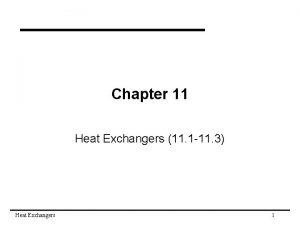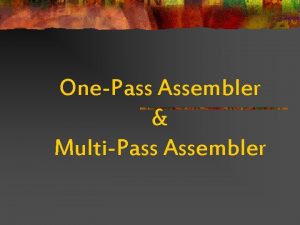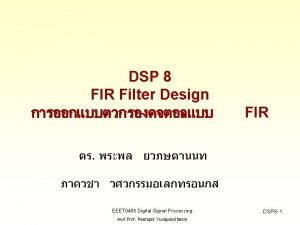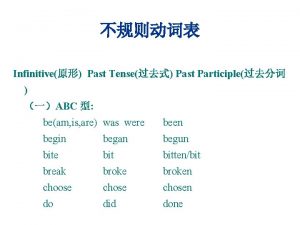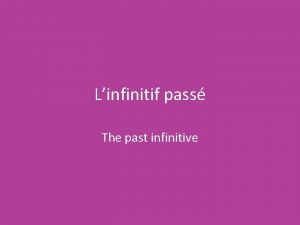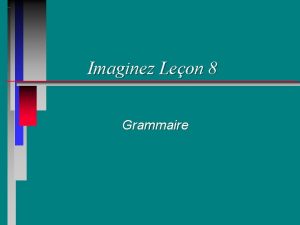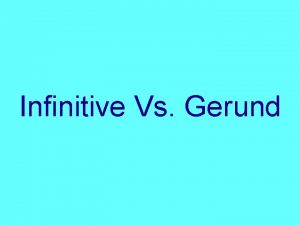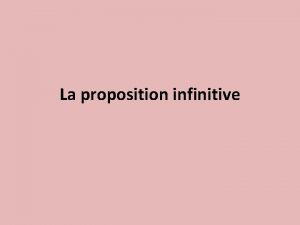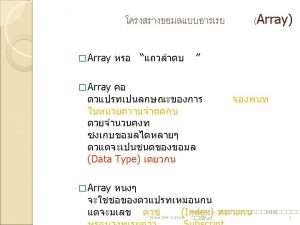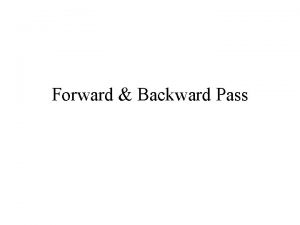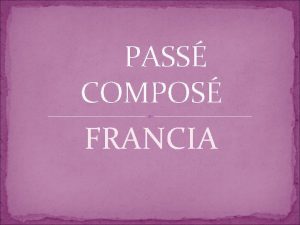Linfinitif pass The past infinitive The Past Infinitive












- Slides: 12

L’infinitif passé The past infinitive

The Past Infinitive • The French infinitif passé (past infinitive) indicates an action that occurred before the action of the main verb of the sentence, but only when the subject of both verbs is the same.

Formation • It is formed much like the passé composé, except that one does not conjugate the auxiliary verb. Thus the formation is as follows: Infinitive auxiliary verb + past participle

Translation • The past infinitive sounds awkward in English we usually change it to another tense or reword the sentence completely. Notice the change in the following examples: Je veux avoir terminé avant midi. - I want to finish (to have finished) by noon. Il regrette d'être venu. - He regrets coming (having come).

Notes • Since the infinitive auxiliary verb is unconjugated, the past infinitive is the same conjugation for all subjects. Je veux avoir terminé. . . I want to have finished. . . Il veut avoir terminé. . . He wants to have finished. . . Nous voulons avoir terminé. . . We want to have finished. . .

Notes • When using the past infinitive where the auxiliary verb is être, you still need to follow the rules of past participle agreement: • Après être allés au ciné, nous sommes allés au café. - After having gone to the movies, we went to the café. • Elle a déchiré son pantalons après être tombée. – She ripped her pants after having fallen.

Notes • Pronomial verbs, such as the reflexive and reciprocal verbs you’ve worked with, still need their reflexive/reciprocal pronoun: Après vous être lavés, vous pouvez manger le petit déjeuner. - After you've washed up, you can eat breakfast. Après m’être habillée, je suis allée au centre commercial. - After getting dressed, I went to the shopping center.

Uses of the Past Infinitive • To modify the adjective in the main clause: – Il est content d'être venu ici il y a un an. – He's happy that he came here a year ago. • To modify the verb in the main clause: – Il se rappelle d'être venu ici il y a un an. – He remembers coming here a year ago. • With the preposition après: – Après t'avoir vu, j'étais heureux. – After seeing you, I was happy.

Uses of the Past Infinitive • When apologizing: – Je m’excuse d’être en retard. • I’m sorry for being late. – Je suis vraiment désolé(e) d’avoir oublié de te téléphoner. • I’m really sorry for having forgotten to phone you. – Pardonne-moi de ne pas avoir répondu. • Pardon me for not having responded. – Je m’en veux d’avoir dit ça. • I feel bad for having said that.

Accepting an apology • • • Ce n’est pas grave. Ça ne fait rien. Il n’y a pas de mal. Ne t’inquiète pas. Ça arrive à tout le monde. It’s not serious. It’s nothing. No harm done. Don’t worry about it. It happens to everyone.

Uses of the Past Infinitive • When expressing gratitude: – Je vous remercie de m'avoir aidé. • I thank you for helping me. – Merci de m’avoir présenté Johnny Depp. • Thank you for introducing Johnny Depp to me.

Negation of the Past Infinitive • As you’ve learned earlier, the two parts of the negative clause (i. e. : ne…pas, ne…jamais) do not wrap around the auxiliary verb, because the verb is in its infinitive form. Both parts of the negative precede the auxiliary verb. – Excusez-moi de ne pas être venu. • Excuse me for not coming (not having come). – Merci de ne pas fumer. • Thank you for not smoking.
 Single pass cross flow heat exchanger
Single pass cross flow heat exchanger What is multi pass assembler
What is multi pass assembler Forward pass vs backward pass
Forward pass vs backward pass Erp boot camp
Erp boot camp Single pass and multi pass heat exchanger
Single pass and multi pass heat exchanger Single pass tubular heater
Single pass tubular heater For forced draught system the function of chimney is mainly
For forced draught system the function of chimney is mainly Explain multi pass assembler
Explain multi pass assembler Lpf/hpf
Lpf/hpf Forgive in past participle
Forgive in past participle Past participle是什么
Past participle是什么 Infinitive bare infinitive
Infinitive bare infinitive Admit ing
Admit ing
